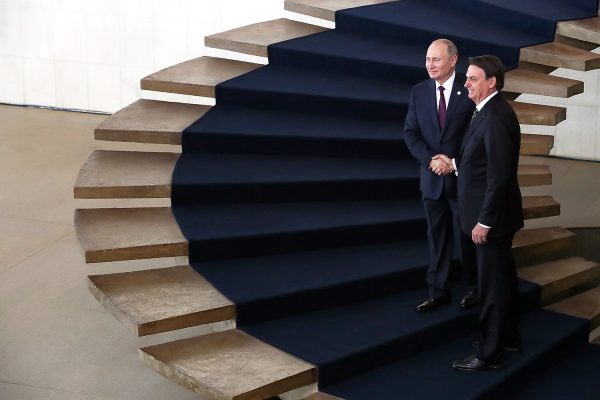
Vladimir Putin has few allies in his war against Ukraine. The democracies of East Asia, Europe and North America are against him, and have imposed unprecedented economic sanctions. Almost the entire rest of the world has condemned the invasion.
A few countries are reluctant, or have outright refused, to take a stand. I asked the Atlantic Sentinel‘s China, India, Israel and South America experts to explain why.
China
Tilman Pradt, author of The Prequel to China’s New Silk Road: Preparing the Ground in Central Asia, gives three reasons why Beijing will not break with Putin:
- Economic interdependence: China bought $6.4 billion worth of Russian goods last year, making it Russia’s largest importer. It gets around 15 percent of its oil from Russia.
- Security: China and Russia have similar problems and similar interests in Central Asia. China’s support for the resource-rich republics of the region is primarily economic, centered on the Belt and Road Initiative. Russia provides military support to the post-Soviet states. Neither power would gain from severing relations.
- Politics: Strong criticism of Russia’s violation of the rights of Ukrainians would raise questions about China’s actions in Hong Kong, Tibet and Xinjiang, as well as its ambitions for Taiwan.
India
Abhijit Iyer-Mitra of the Institute of Peace and Conflict Studies in New Delhi argues India’s priority is evacuating its 20,000-odd students from Ukraine. That requires the acquiescence of the aggressor.
Taking a step back, India’s fear is that isolating Russia will drive it into the arms of China, which is the very thing India has been trying to avoid for seven decades.
A coming-together of the two would be a debacle, and indeed much of India’s obsequiousness toward the Soviet Union and thrusting “Asian leadership” onto China through the 1950s and 60s was to engineer a rivalry between the two.
A Sino-Russian alliance is a nightmare to India, which it why it won’t cut ties with Putin.
It also still relies on Russian weaponry:
India simply can’t replace 60 percent of its armory, which is Russian-sourced, overnight. Similarly, the nuclear submarine program is based entirely on Russian-style reactors and fuel, and is the single most survivable nuclear asset we have.
Israel
Ariel Reichard, an Israeli analyst and consultant who specializes in conflict resolution, counterterrorism and international security, believes his government has been too cautious in trying to find a balance between loyalty to its allies and support for Ukraine — historically home to a large Jewish community — and what it perceives as “an overriding need to maintain good relations with the Kremlin,” whose cooperation or at least acquiescence Israel needs to contain the Iranian presence in Syria.
The Israeli logic is simple: not to anger Putin too much lest he makes Israel’s life very difficult and contain the IDF’s ability to operate effectively against Iranian efforts to build a forward base along Israel’s northern borders.
Israel voted to denounce Russia’s invasion at the UN, but its leaders have otherwise been silent on the war and Israel refuses to sell Ukraine military equipment. (It did sent humanitarian aid.)
Most experts and officials appear to support this “realist” policy. Reichard is critical, pointing out it stands in stark contrast to Israel’s habit of condemning other nations when they “turn a blind eye” to Jewish suffering around the world.
When push comes to shove, Israel adopts the same “balanced” approach it criticizes other countries for. How can the world take Israel’s future protests seriously?
South America
Christian FitzHugh, who specializes in left-wing populism in South America, saw the region dividing in three this week:
- Democracies with close ties to the United States, including Chile, Colombia and Mexico, condemned Russia’s invasion of Ukraine.
- Autocratic Cuba and Venezuela, both recipients of Russian economic and military aid, took Putin’s side.
- Argentina and Brazil, the region’s largest economies, equivocated.
Argentinian president Alberto Fernández, who visited Moscow only last month, has formally denounced the invasion but will be reluctant to go further given recent trade commitments and existing military ties.
Brazil’s Jair Bolsonaro is Putin’s best friend in Latin America. He, too, visited Russia last month.
As Russia’s most important trade partner in Latin America, responsible for a third of trade in the entire region, Brazil has declared itself neutral. As such, Brazil did not sign up to the Organization of American States’ declaration denouncing “the unlawful, unjustified and unprovoked invasion of Ukraine.”
But it appears the government is not united. Vice President Hamilton Mourão has compared Putin to Adolf Hitler and the Brazilian delegation to the United Nations did vote for a resolution condemning Russia’s war.
